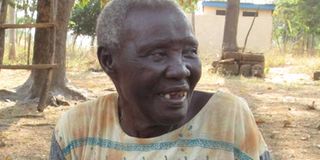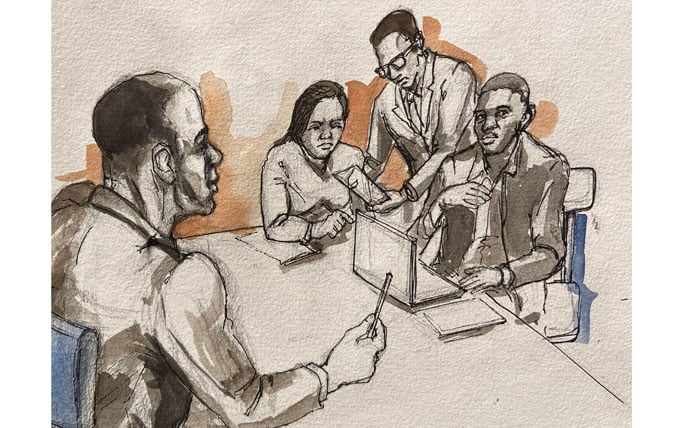Prime
I am glad the day my husband was killed is public holiday - Mary Luwum

Mary Lawinyo Luwum, St Janani Luwum’s widow. She met St Janani Luwum when he was still a primary school teacher at Kitgum Primary School in 1947. Photo by Dan Micheal Komakech
What you need to know:
Ugandans will today gather at Wigweng village, Mucwini Sub-county in Kitgum District to commemorate the 39th anniversary since St Janani Luwum was killed by president Idi Amin’s government. His widow, Mary Luwum recounted to Daily Monitor her journey since the dreadful day.
At 94 years, Mama Mary Lawinyo Luwum, the widow of the deceased Archbishop of the metropolitan Anglican province of Uganda, Boga-Zaire, Rwanda and Burundi, St Janani Luwum, still looks joyful, strong and healthy.
On a visit to her home located in Mican, Pager Division Kitgum municipality, mama Luwum seated under a mango tree welcomes me with a warm reaction and smiles, for an interview on her late husband.
Archbishop Janani Luwum was killed on February 16, 1977 a day after he was arrested on false charges by former president Idi Amin along with other two ministers Erinayo Wilson Oryema and Oboth Ofumbi.
St Janani Luwum was a sharp critic of former president Amin’s government. On several occasions, he challenged Amin’s rule.
Today, many are gatheres at Wigweng village in Mucwini Sub-county, Kitgum district to commemorate the 39th anniversary since St Luwum was killed, Luwum recounted to Daily Monitor her journey since the dreadful day.
To Ms Luwum, her late husband was a humble hero from the Christian faith, who had indiscriminate love for people regardless of their origin, race, ethnicity and religion amidst other values.`
She said during last year’s anniversary, she was delighted when government and international dignitaries supported the anniversary besides declaring it a public holiday.
President Museveni, while presiding over the 38th commemoration anniversary of St Luwum last year declared every February 16, a public holiday in memory of the Anglican martyr.
On Janani Luwum projects
Despite many international projects that have been opened up in the United Kingdom and USA in memory of St Luwum, Luwum said little has been done in Uganda.
She said all she knows of are institutions of learning and theological colleges that were established in memory of her late husband.
“I have visited England where I saw a statue of St Janani Luwum at Westminister Abbey. I felt delighted to see how the foreign world recognises him for his devotion to Christianity,” Luwum said.
Luwum, however, cannot explain as to why the international world has over the years given in close attention to St Luwum unlike the African countries.
In the United Kingdom, a street was named in memory of Luwum while an effigy at Westminster Abbey also stands in honour of the Anglican Martyr.
In California USA, Luwum Memorial Lecture is conducted annually while Luwum Foundation in the Episcopal Church was also founded.
She says that her husband still deserves to be emulated globally as a martyr because he was a true a leader, a father who loved the youth and children.
Ms Luwum is uncertain as to whether member of the international community will attend the memorial celebration due to speculations of election violence.
Accounts of tragic days
Luwum still vividly recounts the events that led to the killing of her husband saying it was the sharp criticism against former president late Idi Amin Dada’s dictatorship government that led to his killing.
Luwum explained that St Janani Luwum on many occasions criticised the dictatorial rule by Idi Amin to the Western world, something she says irked president Amin.
She remembers advising her husband to flee the country fearing that he would be killed but the Archbishop instead said he would rather die in his country than fleeing.
The day that will forever remain the darkest in her life is a telephone call she recalls receiving from a journalist working with Radio Uganda, who broke the news that her husband had died along with two other ministers in a car accident.
“I recalled the moment when we started sensing trouble was on the night of February 5, 1977 at about 10pm. On that night, armed men raided our Namirembe home and demanded that St Luwum produces guns they are alleged he was trading in to over throw president Amin’s government,” she recounted.
She said a week earlier, Amin invited the archbishop to State House in Entebbe but she also insisted on going with him fearing something wrong may happen to him.

St Janani Luwum
At State House, she recalled the arrogant tone of Amin who was accusing St Luwum of tarnishing his name to the western world using defamatory messages against his leadership.
However, to her surprise, Amin later calmed down and instead asked for a photo moment with them to prove contrary account and rumours circulating that the archbishop had been imprisoned.
Two days later after the state house visit, the president again rang St Luwum and informed him to summon all bishops for a conference at the state house on a discussion they weren’t informed about Ms Luwum said.
She said the then Busoga Diocese bishop Cyprian Bamwoze informed her that after the conference, her husband and two other cabinet ministers then (Erinayo Wilson Oryema and Oboth Ofumbi) were ordered to remain behind.
“I was puzzled but hoped for the best,” Ms Luwum narrated.
On February 16, news of that her husband had died in a car crash was everywhere, something she never wanted to believe but she couldn’t run away from the reality.
St Janani Luwum was buried three days later at St Paul’s Church graveyard at Wii Gweng village in Mucwini Sub-county under tight monitoring of military personnel and only two close relatives.
Escape and return from exile
Following the incident, Ms Luwum and other family members fled to the Diocese of Kisumu in Kenya where Bishop Henry Okullo hosted them until their return in 1979 after - Amin was overthrown in a coup.
According to Ms Luwum, life in Kenya was not easy since she was traumatised by her husband’s death.
She said the sudden death of her husband made her and her nine children to become dependants since they had no money at hand.
“The late Janani Luwum had a farm in Kitgum town where he used to dairy cattle we used to survive on proceeds after sale of the milk where later the money would be sent to us in Kenya. The Anglican church too was supportive,” Ms Luwum said.
On Luwum involvement in church
Although age has taken a toll on Ms Luwum and since affected her mobility, her devotion to Christianity has never faded.
At her age, Ms Luwum still conducts fellowships with family members at home and listens to sermons on Christian radios broadcasting on Sundays.
She currently prefers praying from her home since she cannot move to the church.
When asked of her involvements in any of St Janani Luwum’s foundations, Ms Luwum said she has never had a chance.
Advice
Her advice to the current generation is that people should give their lives to God if they are to replicate and practice Archbishop Saint Janani Luwum’s priciples.
Marriage
Ms Luwum who was an orphan then living with a relative in Mican in Kitgum district met St Janani Luwum when he was still a primary school teacher at Kitgum Primary School in 1947.
St Janani Luwum is survived by six children, Ben Luwum, Jollie Luwum Adriko, Irene Luwum Ocaya, Andrew Luwum, Phoebe Aber Luwum and Amos Luwum.
Luwum brief bio
St Janani Luwun hails from central Lwo people of the Nile Valley. He was born in 1924 in Mucwini, to Eliya Okello and Naume Abalo. Abalo had three children – Kutu, Ayero and Janani. Later, Naume and Eliya separated. Eliya then married Aireni Aciro, from Pugoda sub-clan, who became the new mother of the family.




